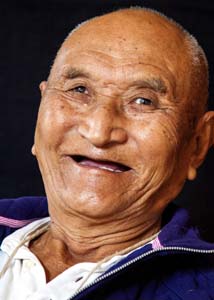Name: Lobsang
(Alias: Yes)
Gender: Male
Interview Age: 82
Date of Birth: 1931
Birthplace: Lukhokma, Kham, Tibet
Year Left Tibet: 1960
Profession: Nomad
Monk/Nun: No
Political Prisoner: No

Interview No.: 5B
Date: 2013-12-31
Language: Tibetan
Location: Lugsung Samdupling Settlement, Bylakuppe, Karnataka, India
Categories: Resistance and Revolution
Keywords: Chinese -- first appearance of, Chinese army -- invasion by , escape experiences, festivals, herding, houses/villages, Kham, nomadic life, refugee in India -- life as, resistance fighters
Summary:
Lobsang was born in Lukhokma in Kham Province. His father was killed in a fight leaving Lobsang with his mother and one sister. They were nomads and Lobsang talks in detail about herding animals and deriving food, drink, shelter, clothing and everything they needed from animals like yaks, dri 'female yak,' sheep and horses. The nomads moved the herds each year in summer and winter in order to find food for the animals.
Lobsang fondly recalls the annual festival of incense offerings and lung ta 'wind horse' prayer flags. Thousands of horsemen gathered on this occasion to participate in horse racing and target shooting competitions. Race horses were very valuable to the nomads and Lobsang prided himself on being a good rider. Lobsang also talks about the importance of ba 'tents made from yak hair' for a nomad family and how they moved their tents between camps.
Lobsang describes the upheaval wrought on the nomadic community when the Chinese appeared in the region. The nomadic men resisted the Chinese army for around three years despite limited arms and ammunition. Lobsang and a group of 100 horsemen miraculously escaped capture and continued towards Lhasa only to learn along the way that Lhasa has been occupied by the Chinese. He recounts his escape to India and establishing of the Bylakuppe Settlement.
Interview Team:
- Marcella Adamski (Interviewer)
- Tenzin Yangchen (Interpreter)
- Pema Tashi (Videographer)

